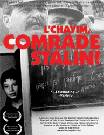|
|
||||
|
|
by Donald Levit  Elegant cynic, Inspector Louis Renault followed the prevailing wind, at that moment from Vichy, but conspicuously implied the fickleness of the breeze. For a number of debatable reasons – collective guilt, other recent genocides, threats of war and efforts at peace, an obsession with the machines and technology of conflict – cinema winds currently reflect and fuel the world’s fascination with the Second World War, European Theater. (Even undeservedly forgotten gems like None Shall Escape are being dusted off by the Film Society of Lincoln Center.) Oddly, although this most recent 1939-45 whirlwind at least superficially claims a social conscience and touches ethical and moral questions, particularly those of the Holocaust, hardly any films (or books) have broached the matter of European Jewry before 1933, and no one approaches the problem of Soviet Jews. Thus, it is a shame that Yale Strom’s unique L’Chayim, Comrade Stalin! is such a pedestrian start at this theme. To be fair, perhaps it needs a bearded depth of Dostoyevskian spirit to comprehend truly the feel and meaning of the vast eastern Soviet Union, just as it is the Russians Kozintsev and Nereyev who have best filmed Quixote of empty La Mancha. The first Jewish homeland since Titus’ Roman conquest of Jerusalem in 70 A.D., the Jewish Autonomous Region was proposed in 1928 by Joseph Stalin, six years before 14,000 square miles were officially so designated. While the Kremlin sought thus to ease tensions in the west fronting Poland, i.e., Belarus and the Ukraine, and to make some propaganda hay, director Strom emphasizes widespread anti-Semitism and a desire for an eastern buffer against Japan, which had occupied China’s Manchuria in 1931-32. Eventually, before violent anti-Semitic purges during the early Cold War, 45,000 Jews came to live in the JAR, representing almost one-quarter of the area’s population. Also an experiment in tying Jews to the land as agrarian peasants removed from traditional shtetl occupations, the Region promised a theoretical revival of Yiddish culture and life, centered around the capital, Birobidzhan. Anticipated sizeable immigration from abroad – the US and Argentina – never materialized, however, for swampland and cruel winters and summers were hardly an attraction. Present liberalization in Russia once more allows Yiddish to attempt to flourish, but it also permits many Jews (and others) to emigrate from this difficult, isolated area. The whole virtually unknown episode deserves to be brought to light, and Strom’s backbone concept – his train ride through immensity to Birobidzhan, accompanied by a personable but anti-Semitic former police interpreter – should be effective. But the film does not gel. Pans of forbidding landscape are laced with almost generic Soviet newsfilm that’s not really related. Interviews with men along the way who deny anti-Semitism or Jews or the JAR as well as with well-off American ladies who lived there as children and a pitifully hopeful young rabbi or a teacher of Yiddish who may leave, are all cut with repeated snippets of the same early propaganda film or Jews themselves joking that there is no such animal as a Landsman with a shovel. Sadly, the effort just does not hold together. A worthwhile labor of love, L’Chayim, Comrade Stalin! leads nowhere and builds nothing; like the Jewish Autonomous Region itself, it is stillborn and empty. If it may move us to curiosity, that is because it fails to plumb the many questions it raises. (Released by The Cinema Guild; not rated by MPAA.) |
||
|
© 2024 - ReelTalk Movie Reviews Website designed by Dot Pitch Studios, LLC |



